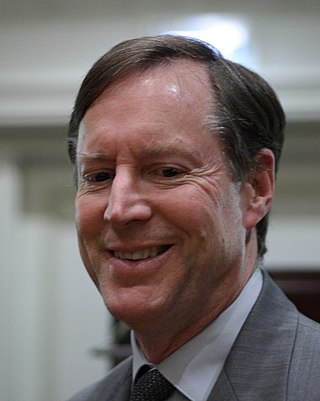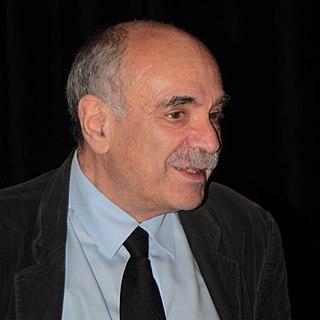Related Research Articles

Lambert Adolphe Jacques Quetelet FRSF or FRSE was a Belgian astronomer, mathematician, statistician and sociologist who founded and directed the Brussels Observatory and was influential in introducing statistical methods to the social sciences. His name is sometimes spelled with an accent as Quételet.

Quantitative research is a research strategy that focuses on quantifying the collection and analysis of data. It is formed from a deductive approach where emphasis is placed on the testing of theory, shaped by empiricist and positivist philosophies.
Actor–network theory (ANT) is a theoretical and methodological approach to social theory where everything in the social and natural worlds exists in constantly shifting networks of relationships. It posits that nothing exists outside those relationships. All the factors involved in a social situation are on the same level, and thus there are no external social forces beyond what and how the network participants interact at present. Thus, objects, ideas, processes, and any other relevant factors are seen as just as important in creating social situations as humans.

Theodore M. Porter is a professor who specializes in the history of science in the Department of History at UCLA. He has authored several books, including The Rise of Statistical Thinking, 1820-1900; and Trust in Numbers: The Pursuit of Objectivity in Science and Public Life, the latter a vast reference for sociology of quantification. His most recent book, published by Princeton University Press in 2018, is Genetics in the Madhouse: The Unknown History of Human Heredity. He graduated from Stanford University with an A.B. in history in 1976 and earned a Ph.D. from Princeton University in 1981. In 2008, he was elected to the American Academy of Arts and Sciences. In 2023, he received the George Sarton Medal for lifetime achievement from the History of Science Society.
Alain Desrosières was a statistician, sociologist and historian of science in France, well known for his work in the history of statistics He is the author of The Politics of Large Numbers: A History of Statistical Reasoning , published in 1993, translated into several languages, including English in 1998, and subsequently reviewed in the LRB in 2000. This described the origins of statistics as technical machinery for administration in the 19th and 20th centuries, including the attempts to measure human and economic development. The text is an account of the statistics and their use in abstracting features of society to better measure and understand them, with particular aims.

Michel Wieviorka is a French sociologist, noted for his work on violence, terrorism, racism, social movements and the theory of social change.
Luc Boltanski is a French sociologist, Professor at the School for Advanced Studies in the Social Sciences, Paris, and founder of the Groupe de Sociologie Politique et Morale, known as the leading figure in the new "pragmatic" school of French sociology. His work has significantly influenced sociology, political economy and social history.

André-Michel Guerry was a French lawyer and amateur statistician. Together with Adolphe Quetelet he may be regarded as the founder of moral statistics which led to the development of criminology, sociology and ultimately, modern social science.
Olivier Fillieule is a political scientist and sociologist. Fillieule serves as Senior Researcher at CNRS, full-time Professor at the University of Lausanne, and Director of the Institute for Political and International Studies (IEPI).

Michel Feher is a Belgian philosopher and cultural theorist who writes in English and French. He is the founding editor of Zone Books and the co-founder and president of Cette France-là, Paris, a monitoring group on French immigration policy. Feher writes for a number of outlets and has a semi-regular blog with the French journal Mediapart. He has held the positions of Professor and Visiting Lecturer at various universities, including École Normale Supérieure in Paris, the University of California, Berkeley, and most recently, Goldsmiths, University of London.

In social sciences, sequence analysis (SA) is concerned with the analysis of sets of categorical sequences that typically describe longitudinal data. Analyzed sequences are encoded representations of, for example, individual life trajectories such as family formation, school to work transitions, working careers, but they may also describe daily or weekly time use or represent the evolution of observed or self-reported health, of political behaviors, or the development stages of organizations. Such sequences are chronologically ordered unlike words or DNA sequences for example.

Édouard Louis is a French writer.
Lucien March was a French demographer, statistician, and engineer.
The sociologyof quantification is the investigation of quantification as a sociological phenomenon in its own right.
Ethics of quantification is the study of the ethical issues associated to different forms of visible or invisible forms of quantification. These could include algorithms, metrics/indicators, statistical and mathematical modelling, as noted in a review of various aspects of sociology of quantification.

Paul-Marie Boulanger is a Belgian sociologist active in the study of sustainable development and consumption.

Andrea Saltelli is an Italian scholar studying quantification with statistical and sociological tools, extending the theory of sensitivity analysis to sensitivity auditing.
The Politics of Large Numbers is a history book by French statistician, sociologist and historian of science, Alain Desrosières, which was originally published in French in 1993. The English translation, by Camille Naish, was published in 1998 by Harvard University Press.
The New Politics of Numbers: Utopia, evidence and democracy is a multi-author book edited by sociologists Andrea Mennicken and Robert Salais and published in 2022 by Palgrave Macmillan.
Trust in numbers is a book of Theodore Porter published in 1995 by Princeton University Press.
References
- ↑ I. Bruno, E. Didier, and T. Vitale, “Editorial: Statactivism: forms of action between disclosure and affirmation,” Open J. Sociopolitical Stud., vol. 2, no. 7, pp. 198–220, 2014.
- 1 2 I. Bruno, E. Didier, and J. Prévieux, Statactivisme. Comment lutter avec des nombres. Paris: Zones, La Découverte, 2014.
- ↑ I. Bruno, E. Didier, and T. Vitale, “Special Issue. Statistics and Activism,” Particip. Conflict. Open J. Sociopolitical Stud., vol. 7, no. 2, 2014.
- 1 2 P. Concialdi, “Le BIP40: alerte sur la pauvreté,” in Statactivisme. Comment lutter avec des nombres, I. Bruno, E. Didier, and J. Prévieux, Eds. Zones, La Découverte, 2014, pp. 199–211.
- ↑ A. Desrosières, The politics of large numbers : a history of statistical reasoning. Harvard University Press, 1998.
- ↑ E. Didier, America by the numbers : quantification, democracy, and the birth of national statistics. MIT press, 2020.
- 1 2 3 A. Desrosières, “Statistics and social critique,” Open J. Sociopolitical Stud., vol. 7, no. 2, pp. 348–359, 2014.
- ↑ T. M. Porter, Trust in Numbers: The Pursuit of Objectivity in Science and Public Life. Princeton University Press, 1995.
- ↑ Society for the Social Studies of Quantification - SSSQ